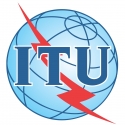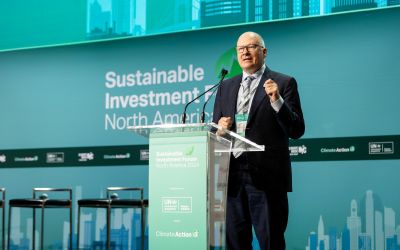ICTs can transform the response to climate change
Houlin Zhao, Secretary-General of the International Telecommunication Union (ITU), shows how investing in information and communications technologies (ICTs) will be essential in helping all countries implement the Paris Agreement.
In Benin, regional supervisors used to monitor their village’s water supply mostly by instinct. But in 2007, a Senegalese software company introduced water supply managers in Benin, and across Africa, to the mWater platform. Now thanks to these information and communications technology (ICT) applications water supply managers can track the entire life cycle of their water supply in an app on the smartphone at his fingertips.
This innovative convergence between utilities and telcos is opening up countless digital opportunities around the world. In Cuba, thanks to a new early warning system, and SMS messages sent to mobile phones country-wide, locals are forewarned when a cyclone’s on the way, so they can get themselves and their families to safe shelter from the storm.
In Kigali, Rwanda, young students used to have to stop studying once the sun set because their home had no electricity. In recent years the government and its partners have brought biogas into homes, a small yet significant part of an overall plan to replace charcoal and firewood with renewables; and which now fulfils 85 per cent of Rwanda’s energy needs. Thanks to ICTs monitoring the grid, homes now have light – and school grades have improved.
In these examples, we see some practical and important ways that ICTs are transforming peoples’ lives by cleverly altering their environments and adding value to existing services. ICTs can play a transformative role in securing a sustainable and energy efficient future, and will be a front line tool in the fight against climate change. ICTs will play a crucial role in helping the world reach all the Sustainable Development Goals (SDGs), and have an immediate part to play in how every country on earth implements the Paris Agreement.
Heavy investments required
Most countries are already looking at how to implement the Paris Agreement at the national level, in particular with regard to reaching their National Determined Contributions (NDCs), which reflects the commitment made by each country to significantly reduce their GHG emissions.
Most of them are looking at the role of ICTs as a key infrastructure that can drive the transformation needed to move towards a low carbon or even a carbon-free future. A first example of such ICT-enabled solutions is the use of radio communications, which has always and will continue to serve as a strong tool for climate monitoring. Some areas where technologies are a necessary tool against climate change include continued observations and long-term monitoring of solar activity to improve a country’s, a region’s, and the world’s knowledge and understanding of the influence of the electromagnetic radiation from the sun on earth’s environment. The next stage of this includes monitoring changes in the atmosphere, oceans, and land surface, and the use of such information for climate change modeling, and continued observations of changes in the ozone layer and their effects on the environment and human health.
Land cover change assessment and understanding of its dynamics are also recognised as essential requirements for sustainable management of natural resources, environmental protection, food security, climate change and humanitarian programmes. Terrestrial and satellite radiocommunication systems contribute to the monitoring of carbon emissions, the changing of ice in polar caps and glaciers, and temperature changes. Another key aspect is the application of modern radiocommunication systems to increase productivity, optimise energy consumption and reduce transport costs, leading to reduced levels of CO2 emissions. ITU works hard to ensure that sufficient radio frequencies are available globally for all these critical services.
The second example I would like to highlight is the use of ICTs to advance towards building Smart Sustainable Cities, another area in which we will need to see further investments over the forthcoming decade. With over half the world population now living in cities, ICTs are becoming ever more important as the means of providing efficiency for mass transport and renewable energy. A Smart Sustainable City is an innovative city that uses ICTs and other means to improve the quality of life, efficiency of urban operation and services and competitiveness, while ensuring that it meets the needs of present and future generations with respect to economic, social, environmental and cultural aspects.
In today’s cities much of the infrastructure is installed by a diverse set of suppliers and maintained by different agencies that sometimes work in isolation. The interconnection of city systems demands standardised interfaces, and standards bodies such as ITU have an important role to play. For city planners, utilities and service and technology providers, standards are essential enablers in achieving consistent levels of performance and quality, as well as compatibility between technologies and economies of scale. Smart Sustainable Cities will require collaboration and consultation with all key stakeholders including citizens, and will be key to the achievement of all the SDGs, but especially SDG 11 on sustainable cities and communities.
Furthermore, smart investments in ICT keep confirming ICT’s power as a positive force for international development for the future. By 2020, more people will probably have mobile phones than electricity at home, bank accounts, or running water. The digital divide between developed and least developed countries (LDCs) will have have to shrink, as much needed investments in broadband grows. The number of countries with National Broadband Plans (NBP) has shown good progress over an eight-year period. Of the 189 countries for which ITU has data, the number with a NBP stands at 151, leaving only 38 without. Average prices for all types of mobile broadband services fell by more than 25 per cent in LDCs in 2016.
These are just a few examples of the incredible potential of ICTs. But fulfilling this potential will require mobilising the right investment. In my role as Secretary-General of ITU I would like to invite all stakeholders from the ICT sector – governments, municipalities, the private sector, academia, entrepreneurs and investors – to work together to mobilise such investments so that the world can start benefiting from the uses of ICTs to address Climate Change. It is a shared responsibility, and it is up to all stakeholders to make it happen.
Read the full Climate Action 2016/17 Publication here








